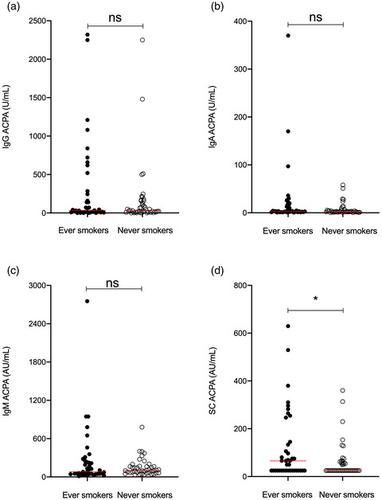当前位置:
X-MOL 学术
›
Clin. Exp. Immunol.
›
论文详情
Our official English website, www.x-mol.net, welcomes your
feedback! (Note: you will need to create a separate account there.)
Circulating anti‐citrullinated protein antibodies containing secretory component are prognostic for arthritis onset in at‐risk patients
Clinical & Experimental Immunology ( IF 3.4 ) Pub Date : 2021-03-06 , DOI: 10.1111/cei.13591 K Roos Ljungberg 1, 2 , K Martinsson 1 , J Wetterö 1 , A Svärd 1, 2 , A Kastbom 1, 3
Clinical & Experimental Immunology ( IF 3.4 ) Pub Date : 2021-03-06 , DOI: 10.1111/cei.13591 K Roos Ljungberg 1, 2 , K Martinsson 1 , J Wetterö 1 , A Svärd 1, 2 , A Kastbom 1, 3
Affiliation

|
Autoantibodies related to rheumatoid arthritis (RA), such as anti‐citrullinated protein antibodies (ACPA), are often detectable in the preclinical period years before arthritis onset. However, events triggering arthritis development remain incompletely known. We aimed to determine whether ACPA isotype levels are prognostic for arthritis development in patients presenting with immunoglobulin (Ig)G ACPA and musculoskeletal pain. Study participants (n = 82) had musculoskeletal pain of any sort and duration and a positive IgG ACPA test. None of the patients had arthritis upon clinical examination at baseline, but during follow‐up (mean = 6 years), 48% developed at least one arthritic joint. IgG, IgA, IgM and secretory component (SC)‐containing ACPA was measured in longitudinally collected serum samples. Cox regression analysis was performed to test the prognostic value of baseline antibody levels and changes over time. All analysed ACPA isotype levels were associated with arthritis development in univariable Cox regression analysis. In multivariable analysis, baseline SC ACPA levels were independently prognostic for arthritis development in multivariable analysis [hazard ratio (HR) = 1·006, 95% confidence interval (CI) = 1·001–1·010, P = 0·012]. There were no significant changes in ACPA isotype levels over time, and no significant association between changes over time and arthritis development. In this prospective longitudinal study, baseline serum SC ACPA levels, but neither IgG, IgA nor IgM ACPA are prognostic for future arthritis development. Repeated measurement of ACPA isotypes do not bring additional prognostic value. The results reinforce a mucosal connection in RA development and encourage further exploration of the mechanisms underlying secretory ACPA formation as a trigger for arthritis development.
中文翻译:

含有分泌成分的循环抗瓜氨酸蛋白抗体可预测高危患者的关节炎发作
与类风湿性关节炎 (RA) 相关的自身抗体,例如抗瓜氨酸蛋白抗体 (ACPA),通常在关节炎发作前的临床前几年就可以检测到。然而,引发关节炎发展的事件仍然不完全清楚。我们旨在确定 ACPA 同种型水平是否对出现免疫球蛋白 (Ig)G ACPA 和肌肉骨骼疼痛的患者的关节炎发展具有预后作用。研究参与者 ( n = 82) 有任何类型和持续时间的肌肉骨骼疼痛,并且 IgG ACPA 测试呈阳性。基线时临床检查时没有患者患有关节炎,但在随访期间(平均 = 6 年),48% 的患者至少发生了一个关节炎关节。在纵向收集的血清样本中测量了 IgG、IgA、IgM 和含有分泌成分 (SC) 的 ACPA。进行 Cox 回归分析以测试基线抗体水平和随时间变化的预后价值。在单变量 Cox 回归分析中,所有分析的 ACPA 同种型水平都与关节炎的发展相关。在多变量分析中,基线 SC ACPA 水平是多变量分析中关节炎发展的独立预后因素 [风险比 (HR) = 1·006,95% 置信区间 (CI) = 1·001–1·010,P = 0·012]。随着时间的推移,ACPA 同种型水平没有显着变化,并且随着时间的推移变化与关节炎发展之间没有显着关联。在这项前瞻性纵向研究中,基线血清 SC ACPA 水平,但 IgG、IgA 和 IgM ACPA 都不是未来关节炎发展的预后因素。重复测量 ACPA 同种型不会带来额外的预后价值。结果加强了 RA 发展中的粘膜连接,并鼓励进一步探索分泌型 ACPA 形成作为关节炎发展触发因素的机制。
更新日期:2021-05-14
中文翻译:

含有分泌成分的循环抗瓜氨酸蛋白抗体可预测高危患者的关节炎发作
与类风湿性关节炎 (RA) 相关的自身抗体,例如抗瓜氨酸蛋白抗体 (ACPA),通常在关节炎发作前的临床前几年就可以检测到。然而,引发关节炎发展的事件仍然不完全清楚。我们旨在确定 ACPA 同种型水平是否对出现免疫球蛋白 (Ig)G ACPA 和肌肉骨骼疼痛的患者的关节炎发展具有预后作用。研究参与者 ( n = 82) 有任何类型和持续时间的肌肉骨骼疼痛,并且 IgG ACPA 测试呈阳性。基线时临床检查时没有患者患有关节炎,但在随访期间(平均 = 6 年),48% 的患者至少发生了一个关节炎关节。在纵向收集的血清样本中测量了 IgG、IgA、IgM 和含有分泌成分 (SC) 的 ACPA。进行 Cox 回归分析以测试基线抗体水平和随时间变化的预后价值。在单变量 Cox 回归分析中,所有分析的 ACPA 同种型水平都与关节炎的发展相关。在多变量分析中,基线 SC ACPA 水平是多变量分析中关节炎发展的独立预后因素 [风险比 (HR) = 1·006,95% 置信区间 (CI) = 1·001–1·010,P = 0·012]。随着时间的推移,ACPA 同种型水平没有显着变化,并且随着时间的推移变化与关节炎发展之间没有显着关联。在这项前瞻性纵向研究中,基线血清 SC ACPA 水平,但 IgG、IgA 和 IgM ACPA 都不是未来关节炎发展的预后因素。重复测量 ACPA 同种型不会带来额外的预后价值。结果加强了 RA 发展中的粘膜连接,并鼓励进一步探索分泌型 ACPA 形成作为关节炎发展触发因素的机制。









































 京公网安备 11010802027423号
京公网安备 11010802027423号